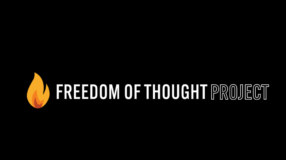2023 Freedom of Thought Conference

State Power Review: Considering the Role of States in Preserving Freedom
Wednesday, June 28, 2023
9:00 AM – 6:15 PM EST
Where:
The Mayflower Hotel
1127 Connecticut Ave NW
Washington, DC 20036
When:
Wednesday, June 28th, 2023
9:00 AM – 6:15 PM EST
Cost:
Conference Only – Free
Conference & CLE (Members) – $50
Conference & CLE (Non-Members) – $100
Panel 1
When Twitter Speaks: Control, Access, and the Role of States
Texas and Florida both recently adopted statutes that regulate content moderation by social media platforms. The statutes were challenged in the Fifth and Eleventh Circuits, raising questions of how to balance the dominant communication networks’ right to exclude users and control their networks against the ability of states to require non-discriminatory treatment. To what extent is content moderation speech or expressive conduct, how should the states’ power to regulate common carriers affect the constitutional analysis, and how is the Supreme Court likely to resolve these questions?
This panel will focus on the disagreement within the right we see in the competing analytical approaches from the Fifth and Eleventh Circuits.
Featuring:
Ryan Baasch, Assistant Solicitor General, Office of the Attorney General, Texas
Alan Gura, Vice President for Litigation, Institute for Free Speech
Ray Treadwell, Chief Deputy General Counsel, Executive Office of the Governor, State of Florida
Jonathan D. Urick, Associate Chief Counsel, U.S. Chamber of Commerce Litigation Center
Moderator: Hon. Chad A. Readler, United States Court of Appeals, Sixth Circuit
Panel 2
Corporate Power and State Power: Structural Protections for Liberty
We recognize the dangers of public power and are familiar with how structural protections of the Constitution can protect against concentrations of power. But as banking and other institutions align to shape firm behavior on contentious policy questions, should we be concerned that private economic power is creating private regulatory order outside of the democratic process? And if so, should states be engaged in countering this sort of concentrations in private power?
Featuring:
Jonathan Berry, Managing Partner, Boyden Gray & Associates
Hon. Rohit Chopra, Director, Consumer Financial Protection Bureau
Alexandra Gaiser, Director of Regulatory Affairs, River Financial
Erika Maley, Principal Deputy Solicitor General, Commonwealth of Virginia
Moderator: Hon. Paul B. Matey, United States Court of Appeals, Third Circuit
Panel 3
Corporate Speech and the First Amendment
How does the First Amendment apply to corporations, and how might it affect initiatives like the Stop Woke Act? Do First Amendment interests and protections apply in the same way for non-profit corporations, closely held corporations, corporations formed for expressive purposes, and publicly traded for-profit corporations? What was the founding era understanding of corporate rights and of state power to protect individual rights, and how might that inform our thinking on state efforts to protect speech and conscience freedoms of employees and other private citizens?
Featuring:
Jim Campbell, Chief Legal Counsel, Alliance Defending Freedom
Prof. Adam Candeub, Professor of Law & Director of the Intellectual Property, Information & Communications Law Program, Michigan State University College of Law
T. Elliot Gaiser, Associate, Jones Day
Casey Mattox, Vice President for Legal and Judicial Strategy, Americans for Prosperity
Moderator: Hon. Lisa Branch, United States Court of Appeals, Eleventh Circuit
Fireside Chat
Corporate Power and the Rule of Law
Featuring:
Ryan Newman, General Counsel, Governor of Florida Ron DeSantis
Moderator: James Burnham, President, Vallecito Capital, LLC
Panel 4
Academic Freedom in Higher Education: The Role of States Defending Freedom of Thought
What policies and practices can states adopt to encourage freedom of thought within higher education? Do state efforts to put constraints on curricula, bar DEI-focused administrators, and limit faculty control of tenure decisions advance or hinder the cause of academic freedom? When claims to academic freedom collide, whose freedoms should the state preserve?
Featuring:
Mark Bauerlein, Emeritus Professor, Emory University; Editor, First Things
Joe Cohn, Legislative and Policy Director, Foundation for Individual Rights in Education (FIRE)
Andrew Ferguson, Solicitor General, Commonwealth of Virginia
Prof. John Hasnas, Professor of Business and Executive Director, Georgetown Institute for the Study of Markets and Ethics, McDonough School of Business, Georgetown University; Professor of Law (by courtesy), Georgetown University Law Center
Moderator: Hon. S. Kyle Duncan, United States Court of Appeals, Fifth Circuit









